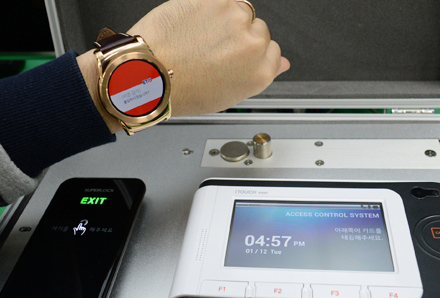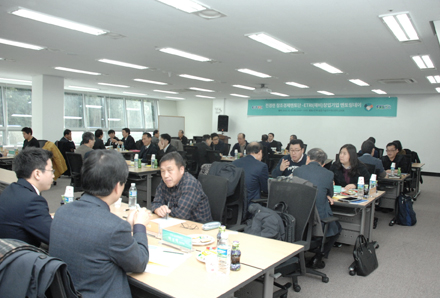
ETRI Successfully Tests Three Authentication Devices
Biometric authentication technology has come into the spotlight with the increasing importance of security. Against this backdrop, ETRI has developed smart authentication devices with strengthened security compared to the existing biometric authentication technology and successfully passed FIDO interoperability test.
Although biometrics became popular as a means for authentication to replace passwords, the method of using smart cards is emerging as a superior alternative in areas requiring stronger security because it is safer to save major key information in a card. ETRI has recently developed an authentication device that satisfies the international standard and is resistant to hacking. The following three authentication technologies were developed by the institution and then passed FIDO interoperability test held in the United States: a smartcard authenticator working with a smartphone, an authentication device involving a smart watch, and FIDO client suite for iOS using TouchID. Dr. Soo-hyung Kim, Director of ETRI’s Authentication Research Section explained, “The new technology is safer because its hardware can be protected in a safer manner and it uses more powerful authentication means such as biometrics or ownership-based authentication.”
In the case of smart watches, users standing in front of a car can be issued a security token from the authentication server via their smart watch and borrow the car conveniently. Troublesome authentication processes can be also replaced by Bluetooth or NFC (near field communication) to ensure more convenient access control systems. ETRI also introduced a follow-up FIDO authentication technology for banking transactions. The new technology can verify users in a much easier and safer way by using various biometric information such as fingerprints, face, and voice, instead of the traditional password. Since such biometric information is not saved into the server and instead is saved in terminal hardware, it becomes possible to prevent any leakage resulting from hacking or violation of privacy. “Now we can choose from a wider variety of authentication means and they are based on the international standard of FIDO,” said Dr. Seung-hun Jin, Managing Director, Information Security Research Division. “Therefore, the new technology has far better flexibility, expandability, and security.” The internationally certified technologies have been transferred to 16 companies thus far, and further technology development is expected to help strengthen security of authentication devices and increase the types of authenticator. ETRI plans to continue advancing its FIDO technology and expand the use of its biometric authentication technology to personal computers and web browsers.

ETRI Provides Mentoring Program for Start-ups
ETRI has decided to partner with the Federation of Korean Industries(FKI) to help the growth of start-up companies.
Jointly with the FKI’s Creative Economy Mentoring Group consisting of executives of large companies and CEOs of smaller businesses, ETRI held a matching event to provide an intensive mentoring service to ETRI start-ups on February 2, 2016.
The event was designed to connect professional mentors with start-ups established by former ETRI researchers and to provide assistance related to business administration. 12 companies participated in the program, including RCN(founded in 2014); Magenta Robotics, Coolio, Gubernet, Babyplus(all founded in 2015); and QUI, Heungmijinjin, Book Traps(to be founded in 2016).
The matching event was attended by 10 companies. For this event, ETRI received applications from start-ups and asked them to select an area for mentoring and mentors from the shortlist of mentors. As a result, it matched each company with mentors from the FKI Center for Large and Small Business Cooperation and provided the mentors with company information beforehand. ETRI plans to provide intensive mentoring service for the next six months and extend the period, if necessary, to substantially help business growth.
ETRI has thus far worked with professional institutions and sought their consulting services in order to further develop the business models of start-ups founded by its former researchers. It explains that the matching event is a starting point to ensure mid- to long-term mentoring support for start-up companies, a prerequisite for addressing challenges faced by start-ups and improving business models. “Technology-based start-ups in their initial stage need practical knowhow of experienced companies,” said Dr. Seo-gyun Kim, Executive Director of the SMEs Cooperation Department. “Based on shared understanding of such need, we held the mentoring event.” Since 2011, ETRI has established 31 start-up companies through its preliminary start-up support program. A total of seven start-up businesses are scheduled to be founded as corporations this March, and ETRI will continue its effort to help them grow into SMEs by reinforcing its support measures for the growth of start-ups.